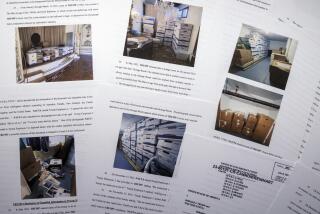Women Lawyers Get Advice on Countering Sexual Bias
- Share via
SAN FRANCISCO — The judge had called the male lawyer by name but referred repeatedly to the woman attorney in court as “young lady.” Exasperated, the female lawyer finally called the jurist “old man.”
She was threatened with contempt by a red-faced judge. But the lawyer, LaDoris H. Cordell, recalled Thursday that even though she eventually lost the case she believed she had made her point by responding sharply to his demeaning comment.
In the first conference of its kind, more than 350 women attorneys gathered to hear from Cordell--now a judge--and other experts with advice on how to counter sexual bias in the courtroom and the legal profession.
The novel training session opened as results from a nationwide survey aired new complaints of widespread sexual bias and harassment against women litigators.
In a poll by the publishing firm Prentice Hall Law & Business, 56% of 553 female lawyers reported sexual harassment by law firm colleagues or opposing counsel. Forty-five percent reported harassment by clients and 31% by judges. In addition, 5% said sexual harassment was a pervasive problem, 22% a large problem and 67% somewhat of a problem.
At the conference, sponsored by Prentice Hall and the American Bar Assn., the women lawyers were told by a panel of judges and attorneys that, if necessary, they should lay the groundwork to appeal adverse rulings they believe result from judicial bias.
One panelist discussed a December ruling by a California Court of Appeal that cited biased remarks by a trial judge as grounds for overturning a decision denying a woman in a divorce case a 50% share of her millionaire husband’s earnings during their marriage.
The judge, questioning the woman’s claim that the husband, as a live-in lover, had been the first to propose marriage, suggested that marriage was “the last thing on (the husband’s mind) and observed: “Why in heaven’s name do you ‘buy the cow when you get the milk free,’ as we used to say.”
(The judge, Orange County Superior Court Judge Ragnar R. Engebretsen, said that he likes quips and had no discriminatory intent in making the comment).
Bobbie L. Welling, senior staff attorney for the state Administrative Office of the Courts, said the appellate ruling rebuking Engebretsen sent a message to trial judges throughout California.
Welling said studies of sexual discrimination in California and other states had revealed “a consistent picture of gender bias in our state court systems . . . and uniformly stress the need to have diversity among judges and high-level legal professionals.”
She noted that California has recently initiated pilot dispute-resolution programs in which complaints of judicial bias are received by local bar associations and passed on informally to judges. The projects, known as “just knock it off” groups, have performed “rather well” thus far, she said.
U.S. District Judge Fern M. Smith of San Francisco told the lawyers they would do well to learn all they can about the judge they will be facing in court so they can be prepared to counter any sexual bias. “Along with knowing the case, knowing the facts and knowing the law, you’ve got to know your judge,” Smith said.
More to Read
Sign up for Essential California
The most important California stories and recommendations in your inbox every morning.
You may occasionally receive promotional content from the Los Angeles Times.













